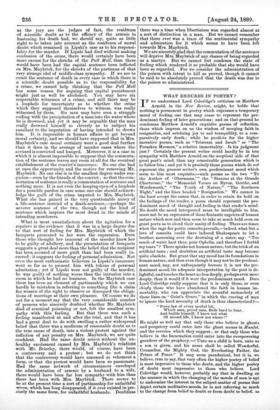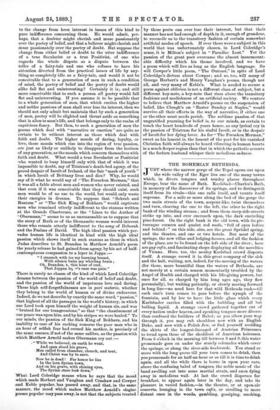WHAT ENDURES IN POETRY ?
IF we understand Lord Coleridge's criticism on Matthew Arnold, in the New Review, aright, he holds that nothing is permanent in poetry which expresses a temporary mood of feeling, one that may cease to represent the pre-
dominant feeling of later generations ; and on that ground he condemns Matthew Arnold's exquisite poems of reflection, those which impress on us the wisdom of merging faith in resignation, and subduing joy to sad tranquillity, to a com- paratively early death ; while he predicts for the higher narrative poems, such as " Tristram and Iseult " or " The Forsaken Merman," a relative immortality. Is his judgment just P Certainly the present writer could hardly be in less
sympathy with Matthew Arnold on the sceptical side of that great poet's mind, than any conceivable generation which is to follow him ; and yet it is precisely those poems which do not
represent the present writer's own predominant mood which seem to him most exquisite,—such poems as the two " To the Author of Obermann,'" the " Stanzas at the Grande Chartreuse," the "Memorial Verses on Byron, Goethe, and Wordsworth," "The Youth of Nature," "The Southern Night," and the lines headed " Resignation." We cannot in the least accept the canon that, in order to retain its hold on the feelings of the reader, a poem should represent the pre- dominant mood of thought and feeling in that reader's mind.
No doubt the mood interpreted must be intelligible to him, must not be an expression of those fantastic caprices of human nature which now and then seem to take so much hold even on great poets as to cloud their sanity of feeling. There are times when the rage for poetic conceits prevails,—indeed, what but a love of conceits could have induced Shakespeare to let a brother, mourning over the drowning of a sister, say : "Too much of water hast thou, poor Ophelia, and therefore I forbid my tears " P There speaks not human nature, but the trick of an
artificial taste ; and doubtless an artificial taste may become quite obsolete. But grant that any mood has its foundations in human nature, and then even though it may not be the predomi- nant mood, nay, not unfrequently because it is not the pre- dominant mood, its adequate interpretation by the poet is de- lightful, and touches the heart no less deeply, perhaps even more deeply, than it would if it were the predominant mood. Does Lord Coleridge really suppose that it is only those, or even chiefly those who have abandoned the faith in human im- mortality, who can appreciate the scornful melancholy of those lines on " Geist's Grave," in which the craving of man
to ignore the hard necessity of death is thus characterised P-
" Stern law of every mortal lot,
Which man, proud man, finds hard to bear, And builds himself, I know not what Of second life, I know not where !"
Re might as well say that only those who believe in ghosts and purgatory could enter into the ghost scenes in Hamlet, and the reveries which they suggest ; or that only those who believe in the Incarnation could enter into the overpowering grandeur of the prophecy,—P Unto us a child is born, unto us a son is given, and his name shall be called Wonderful, Counsellor, the Mighty God, the Everlasting Father, the Prince of Peace." It may seem paradoxical, but it is, we believe, true to say, that very often the higher poetry of belief is most impressive to those who doubt, and the higher poetry of doubt most impressive to those who believe. Lord Coleridge would, however, probably say that in dwelling on the manner in which the changing of the moods of men is apt to undermine the interest in the subject-matter of poems that depict certain meditative moods, he is not referring so much to the change from belief to doubt or from doubt to belief, as
to the change from keen interest in issues of this kind to pure indifference concerning them. He would admit, per- haps, that a doubter might cherish and muse passionately over the poetry of belief, and that a believer might cherish and Muse passionately over the poetry of doubt. But suppose the change from either belief or doubt to the utter indifference of a true Secularist or a true Positivist, of one who regards the whole dispute as a dispute between the teller of a fairy-tale and one who refuses to have his attention diverted from the practical issues of life by any- thing so completely idle as a fairy-tale, and would it not be
conceivable that to a generation of men in such a condition of mind, the poetry of belief and the poetry of doubt would alike fall flat and uninteresting? Certainly it is; and still more conceivable that to such a person all. poetry would fall fiat and uninteresting. If you assume it to be possible that to a whole generation of men, that which excites the higher and nobler passions of man shall ever lose its interest, then we
should not only admit but maintain that by such a generation of men, poetry will be alighted and thrust aside as something that is alien to man's life, and that belongs only to the realm of capricious fancy. But then, to such a generation of men the poems which deal with " narrative or emotion" are quite as certain to be without interest as those which deal with faith and doubt. The higher moods of daring, loyalty, or love, those moods which rise into the region of true passion, .are just as likely or unlikely to disappear from the horizon of any generation, as the moods which concern themselves with faith and doubt. What would a true Secularist or Positivist who wanted to busy himself only with that of which it was impossible to doubt, say of Tristram's death-bed agony, of the proud despair of Iseult of Ireland, of the fair "mask of youth " in which Iseult of Brittany lives and dies P Why, he would say of it what he would say of " The Forsaken Merman," that it was all a fable about men and women who never existed, and that even if it was conceivable that they should exist, such men would be of no use to the world, but would only waste their energies in dreams. To suppose that " Sohrab and Rasta= " or "The Sick King of Bokhara" would captivate men who remained utterly indifferent to the stanzas written at the Grande Chartreuse, or the " Lines to the Author of • Obermann,' " seems to us as unreasonableas to suppose that the story of Ruth or of the Shunamite woman would interest those who remain utterly indifferent to the song of Deborah and the Psalms of David. The high ideal passion which per- vades human life is identical in kind with the high ideal passion which shows itself in such stanzas as those in which
Judas describes to St. Brandan in Matthew Arnold's poem -the yearly release he had gained from agony, by his act of half- contemptuous compassion to a leper in Joppa :— " I staunch with ice my burning breast, With silence balm my whirling brain ; Oh, Brandan, tA. this hour of rest, That Joppan lei sr's ease was pain."
'There is surely no chasm of the kind of which Lord Coleridge dreams between the passion of the world of belief and doubt, and the passion of the world of impetuous love and daring. These high self-forgetfulnesses are in pari materia, whether
they belong to the world of human or of divine endeavour. Indeed, do we not describe by exactly the same word, " passion," that highest of all the passages in the world's history, in which our Lord took upon himself the weight of human sin, and was "bruised for our trangressions," so that "the chastisement of our peace was upon him, and by his stripes we were healed." To our minds, the passion of the Sick King of Bokhara, and his inability to ease of his racking remorse the poor man who in an hour of selfish fear had cursed his mother, is precisely of the same essence, if not of the same calibre, as the passion with which Matthew Arnold makes Oberman cry out :-
. While we believed, on earth he went. And open stood his grave,
Men called from chamber, church, and tent, And Christ was by to save.
Now he is dead ! Far hence he lies In the lorn Syrian town, And on his grave, with shining eyes, The Syrian stars look down.'
What Lord Coleridge means when he says that the mood which made Herbert and Vaughan and Crashaw and Cowper and Keble popular, has passed away, and that, in the same manner, the mood which makes Matthew Arnold's elegiac poems popular may pass away, is not that the subjects treated by these poets can ever lose their interest, but that their manner has not had enough of depth in it, enough of grandeur, to reconcile us to the transitory fashion of certain somewhat artificial modes of speech. If ever there were a subject in this world that was unfortunately chosen, in Lord Coleridge's sense, it is Milton's subject in " Paradise Lost." Yet the passion of the great poet overcame the almost insurmount- able difficulty which his theme involved, and we have a poem which will live as long as the English language. So will Cowper's little poem, " The Outcast," in spite of Lord Coleridge's dictum about Cowper; and so, too, will many of George Herbert's and Henry Vaughan's poems, though not all, and very many of Keble's. What is needed to secure a poem against oblivion is not a different class of subject, but a different key-note, a key-note that rises above the transitory fashions and modishness of an artificial society. We venture to believe that Matthew Arnold's poems on the suspension of belief, like Clough's on " Easter Sunday at Naples," would survive all their efforts in the way of narrative, if either one or the other must needs perish. The sublime passion of that ungratified yearning for belief is, to our minds, as certain to touch the heart hundreds of years hence, as any lyrical cry in the passion of Tristram for his sinful Iseult, or in the despair of Iseult for her dying lover. As for " The Forsaken Merman," sweet as his lament is, the lament of the poet for his vanished Christian faith will always be heard vibrating in human hearts in a much deeper region than that in which the pathetic accents of the forlorn husband whisper their melodious sadness.



































 Previous page
Previous page